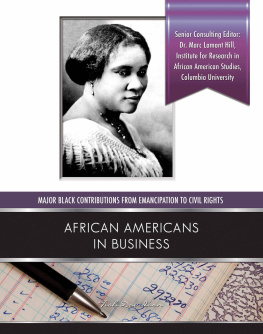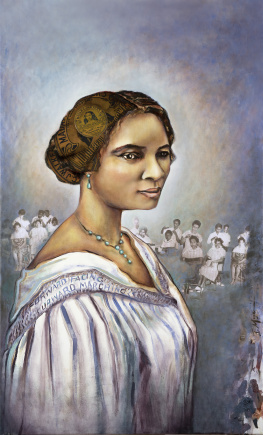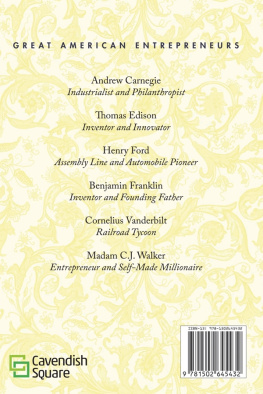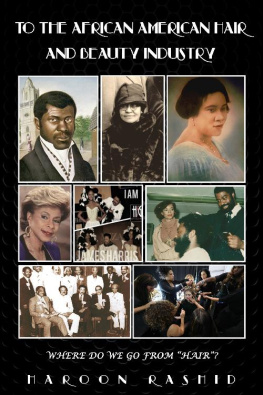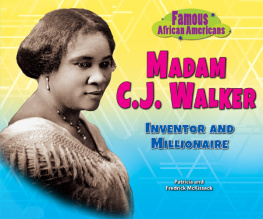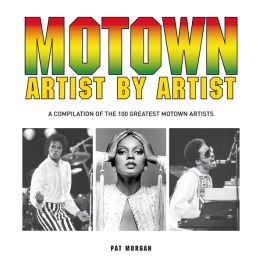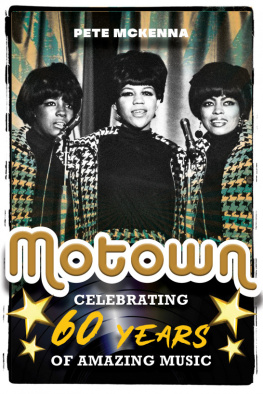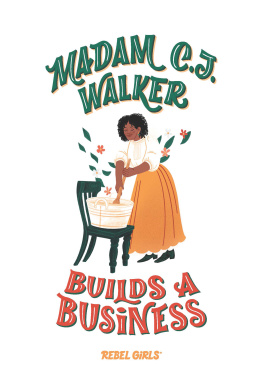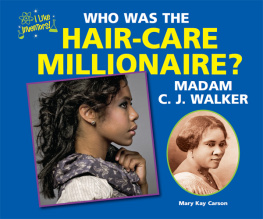
AFRICAN-AMERICANS
IN BUSINESS
TISH DAVIDSON
TITLES IN THIS SERIES
AFRICAN-AMERICAN ACTIVISTS
AFRICAN-AMERICAN ARTISTS
AFRICAN-AMERICAN EDUCATORS
AFRICAN-AMERICAN MUSICIANS
AFRICAN-AMERICAN SCIENTISTS AND INVENTORS
AFRICAN-AMERICAN WRITERS AND JOURNALISTS
AFRICAN AMERICANS IN BUSINESS
AFRICAN AMERICANS IN LAW AND POLITICS
AFRICAN AMERICANS IN THE MILITARY
AFRICAN AMERICANS IN RADIO, FILM, AND TV ENTERTAINMENT
AFRICAN AMERICANS IN SPORTS
A HISTORY OF THE CIVIL RIGHTS MOVEMENT
AFRICAN-AMERICANS
IN BUSINESS

TISH DAVIDSON

MASON CREST
PHILADELPHIA
 | Mason Crest
370 Reed Road, Suite 302
Broomall, PA 19008
www.MasonCrest.com |
Copyright 2013 by Mason Crest, an imprint of National Highlights, Inc.
All rights reserved. No part of this publication may be reproduced or transmitted in any form or by any means, electronic or mechanical, including photocopying, recording, taping, or any information storage and retrieval system, without permission from the publisher.
Printed and bound in the United States of America.
CPSIA Compliance Information: Batch #MBC2012-7. For further information, contact Mason Crest at 1-866-MCP-Book.
First printing
1 3 5 7 9 8 6 4 2
Library of Congress Cataloging-in-Publication Data
Davidson, Tish.
African Americans in business / Tish Davidson.
p. cm. (Major black contributions from emancipation to civil rights)
Includes bibliographical references and index.
ISBN 978-1-4222-2377-2 (hc)
ISBN 978-1-4222-2390-1 (pb)
1. African American business enterprisesHistoryJuvenile literature. 2. African American businesspeopleHistoryJuvenile literature. 3. EntrepreneurshipUnited StatesHistoryJuvenile literature. I. Title.
HD2358.5.U6D38 2012
338.642208996073dc23
2011051941
Publishers note: All quotations in this book are taken from original sources, and contain the spelling and grammatical inconsistencies of the original texts.
Picture credits: Associated Press: (inset).
TABLE OF CONTENTS
by Dr. Marc Lamont Hill,
Institute for Research in African American Studies at Columbia University.

Dr. Marc Lamont Hill
I t is impossible to tell the story of America without telling the story of Black Americans. From the struggle to end slavery, all the way to the election of the first Black president, the Black experience has been a window into Americas own movement toward becoming a more perfect union. Through the tragedies and triumphs of Blacks in America, we gain a more full understanding of our collective history and a richer appreciation of our collective journey. This book series, MAJOR BLACK CONTRIBUTIONS FROM EMANCIPATION TO CIVIL RIGHTS, spotlights that journey by showing the many ways that Black Americans have been a central part of our nations development.
In this series, we are reminded that Blacks were not merely objects of history, swept up in the winds of social and political inevitability. Rather, since the end of legal slavery, Black men and women have actively fought for their own rights and freedoms. It is through their courageous efforts (along with the efforts of allies of all races) that Blacks are able to enjoy ever increasing levels of inclusion in American democracy. Through this series, we learn the names and stories of some of the most important contributors to our democracy.
But this series goes far beyond the story of slavery to freedom. The books in this series also demonstrate the various contributions of Black Americans to the nations social, cultural, technological, and intellectual growth. While these books provide new and deeper insights into the lives and stories of familiar figures like Martin Luther King, Michael Jordan, and Oprah Winfrey, they also introduce readers to the contributions of countless heroes who have often been pushed to the margins of history. In reading this series, we are able to see that Blacks have been key contributors across every field of human endeavor.
Although this is a series is about Black Americans, it is important and necessary reading for everyone. While readers of color will find enormous purpose and pride in uncovering the history of their ancestors, these books should also create similar sentiments among readers of all races and ethnicities. By understanding the rich and deep history of Blacks, a group often ignored or marginalized in history, we are reminded that everyone has a story. Everyone has a contribution. Everyone matters.
The insights of these books are necessary for creating deeper, richer, and more inclusive classrooms. More importantly, they remind us of the power and possibility of individuals of all races, places, and traditions. Such insights not only allow us to understand the past, but to create a more beautiful future.


An African-American store owner stands in the doorway of his Harlem grocery, circa 1940; the sign above reads Our Own Community Grocery & Delicatessen. For many years, businesses owned by African American were mostly limited to black customers, because many whites refused to buy their products or shop in their stores.
GROWING BLACK BUSINESSES
E very day, African Americans start new businesses. As with all new businesses, many of them will fail. Some will grow for a while and then collapse. A few succeed beyond their founders wildest expectations. After the Civil War ended in 1865, African Americans had to build new social and business networks. Some newly freed blacks used skills they had learned as slaves to start businesses. But black entrepreneurs faced many obstacles. They often had little education or experience with business. Banks would not lend them money. Whites would not buy from them, and their African American customers were often so poor that business owners had to accept vegetables, eggs, and chickens from them instead of cash. African Americans also faced racism. Successful black enterprises were sometimes driven out of business by jealous whites using threats and force.
Between 1910 and 1915, there was a great migration of African Americans from farms in the South to cities in the North. More blacks in cities meant more customers for black businesses. In the South, segregation forced black people to use black-owned restaurants, stores, and services. In the North, white businesses made blacks feel unwelcome. Black-owned stores took advantage of this. One black-owned shop advertised itself as a place where Negro ladies can have their dresses fitted and be treated like ladies.
Next page
